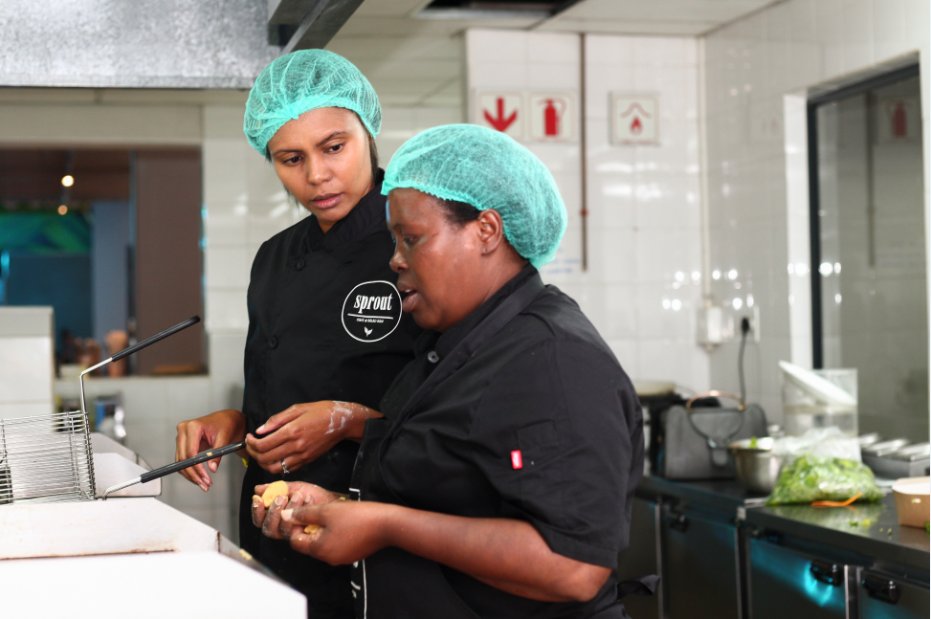The restaurant market still hungers for healthy options. This entrepreneur is feeding that need, serving earth-conscious customers and gym junkies.
Her desperation for a healthy meal fueled the fire for business.
Leigh Klapthor, 31, couldn’t find enough eateries that sold healthy food that was not bland, so decided to start her own.
“It is no fun to go out with friends and you are always the girl with the green salad,” she says.
“I wanted to find a way where being healthy is not such a chore and I also wanted for it to be affordable.”
Loading...
Klapthor, who dropped out of a course in marketing communications at the University of Johannesburg, ditched a job in corporate marketing to pursue her passion for food.

In 2017, she started Sprout Café at the Stoneridge Centre in Edenvale in Johannesburg with a loan she received from her husband’s business and money that was given to them as a wedding gift.
“Everybody underestimates what everything will end up costing [when starting a new business]. In my mind, I thought R150,000 ($10,588) would work. I thought I would get my shop fitting and everything done and in the first month we would be able to pay salaries with the money we make,” says Klapthor.
But she soon realized the unforeseen challenges faced by many entrepreneurs. She had to eventually pump in a capital of R350,000 ($24,706) to start the venture.
“So I had a couple of life lessons at the beginning. I had to end up using our savings but I didn’t mind having to do that because I trusted and believed in the vision.”
But though she did, the banks did not because they often declined all her loan applications.
“I think there are so many young black and enthusiastic individuals that have brilliant ideas and vision but the investment capital is not there. Though I do not have the capital as well to assist them, I would say keep going because the vision is greater,” Klapthor says.
Sprout Café offers health food, light meals, vegan food, and vegetarian and ketogenic diet food.
With her corporate marketing skills, she advertised her food on social media and gained a lot of traction.
“I want to create food on Instagram and people are like, ‘oh my God, I want to eat that’ and when they come into the store, it is the same deliverable they receive,” she says.
Sprout Café turns over R3 million ($211,677) annually and has 10 employees.
After only two years of business, she has recently opened a second branch in the heart of the busy Moove Motion Fitness Club in Sunninghill in Johannesburg.
“There are people that are on specific diets and there is no one that is giving these people food. There is no one that is saying, vegan people want to be healthy too. They are making a conscious decision to preserve the environment and preserve their health and they are making these decisions but there is no one that is there to accommodate them.”
Klapthor says that the world is moving towards a plant-based lifestyle and she believes that many have recently caught on to that idea recently.
Trend translator Bronwyn Williams of Flux Trends, reiterates Klapthor’s views on how the world is adopting healthier habits. She believes that Generation Z is choosing good, clean fun the most.
“Yes, South Africa is not exempt from the global movement towards more locally-sourced and earth-friendly products and packaging,” Williams says.
However, Williams believes that because 64.2% of the South African population still lives in poverty, clean and organic food still remains costly for the majority of people.
“That said, unfortunately, earth-friendly consumer options remain a luxury that only the upper middle class can really afford to support and enjoy… certified organic, eco-friendly products tend to cost far more—up to 40% more than ‘regular’ packaged produce, it would be disingenuous to say that what the market wants is locally-sourced, earth-first produce when the majority of South Africans are struggling just to put any food on the table,” Williams says.

Though Klapthor knows more people are opening healthy-eating establishments because they see that it is a trend, she believes that they need to be in touch with the reality of an ordinary person’s life and consider the cost implications.
“You can’t charge someone R150 ($10.59) for a Beyond Meat burger and expect her to come back tomorrow for the same burger. People are tight with their money and they work hard for it, they do not want to let go, for instance, of R500 ($35.29) in three days,” Klapthor says.
“We want to provide a healthy lifestyle, something that is consistent and that people can live through, and not just a treat-themselves-to at the end of the month. Every day, you should be able to eat a Sprout meal without having to feel any kind of guilt and shame.”
Obviously, it is a concept that has worked and keeps her business healthy as well.
Loading...
